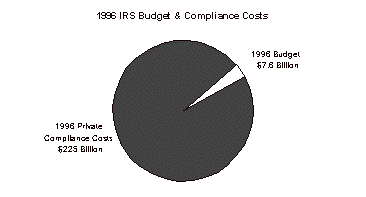A 20-30% sales tax will bring an underground economy.
No more than the 40%+ income/payroll tax does now!!
Tax Evasion: The Underground Economy
| The FairTax and Tax Evasion Opponents of the FairTax like to assert that a federal sales tax would increase tax evasion. It is more likely, however, that the FairTax would increase tax compliance while reducing compliance costs at the same time. It is impossible to argue in good faith that the current approach is doing its job since the problem is getting worse with the passage of time despite major and ever more intrusive attempts to address the problem. ***
Much is made from the fact that a federal sales tax would place the responsibility for tax collection with the retailer, a sector of the economy in which small businesses are better represented. Small businesses are viewed as more likely to evade taxes since the owner, and beneficiary of tax evasion, is more likely to also be responsible for keeping the books and filing the tax returns. While there is, of course, some truth to the proposition that evasion rates among small businesses are higher, it is highly implausible to suggest that evasion would increase under the FairTax. First, those small businesspersons that are inclined to cheat on their sales tax are probably already cheating on their income tax and would be inclined to do so under any tax system. Second, the economic importance of small firms in the retail sector is usually grossly overstated According to the Joint Committee on Taxation (JCT), small firms only account for 14.9 percent of gross receipts by all retailers, wholesalers and service providers.[19] Since the gross receipts of wholesalers would not typically be subject to tax, the true scope of the small "problem" companies is smaller still. However, sole proprietorships, perhaps the most likely to evade tax under the present system and under the FairTax, are not included in the JCT figures.
Any one of the 118 million income tax filers can cheat the income tax system today, and a great many do so. Under the FairTax, however, only retailers (about 14 million-tax filers altogether) would be in a position to cheat In addition, the vast majority of retail sales, 90 percent, are made by large firms that are less likely or find it more difficult to cheat. A retailer who cheats under the income tax system has very similar, if not the same financial gain, as a retailer who cheats under the FairTax system. If a retailer under the FairTax system, failed to report taxable sales, the government would lose and the evader would gain by an amount equal to the sales tax on the good or service purchased. In an income tax system, the government loses and the evader gains by an amount equal to the marginal income tax rate times the amount not reported. An income tax evader will see his taxable income go down dollar for dollar, for every dollar of income not reported. Typically, failing to report a small fraction of a business' gross income will be sufficient to drive its reported profit to zero.
Even if, however, we were to make the unlikely assumption that evasion rates would be higher under the FairTax system than under an income tax system, they would have to be much higher to justify the income tax's huge compliance costs (estimated to be over $225 billion in 1996), many of which are incurred by businesses and are deductible as a business expense. Moreover, if compliance proved to be a problem, information reporting along the lines of present law (1099's) could be implemented to facilitate cross-checking by government auditors. These 1099s would reflect the quantity of product sold to retailers. An auditor could then ensure that the retailer's books either reflected a sale of these products or that the products were in inventory. The FairTax requires all businesses (including non-retailers) to keep business records kept in the ordinary course of business that would aid cross checking by government auditors.[22]
The FairTax is likely to reduce rather than exacerbate the problem of tax evasion. The increased fairness, transparency, and legitimacy of the system will induce more compliance. The roughly 85 to 90 percent reduction in filers will enable tax administrators to address instances of noncompliance more effectively, and increase the likelihood that tax evasion will be discovered. The relative simplicity of the FairTax will promote compliance. Businesses will need to answer one question to determine the tax due: how much was sold to consumers? Finally, the dramatic reduction in marginal tax rates will reduce the gains from tax evasion. If the cost of noncompliance remains comparable (or even increases due to the increased likelihood of getting caught caused by the much smaller number of filers), then both the expected profit from and frequency of tax evasion will decline |
|||||||||||||||||||||||||||||||||||||||||||||

